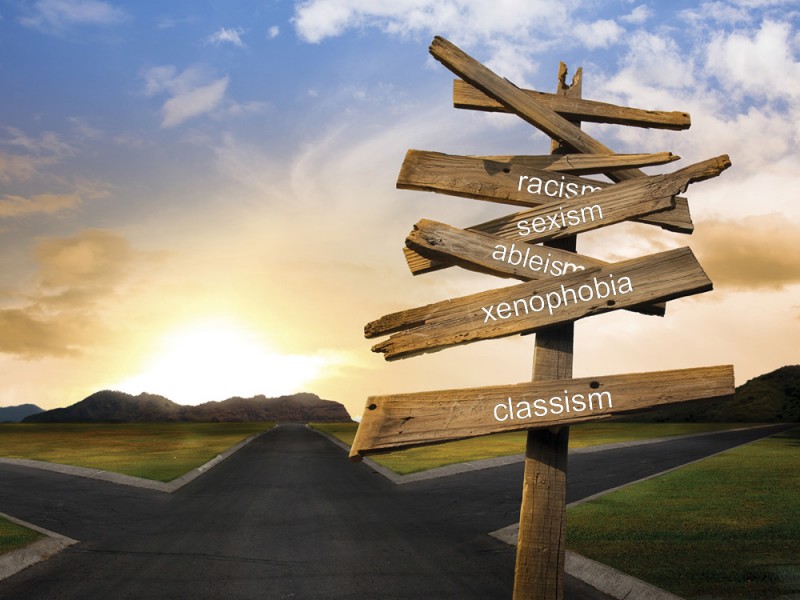Intersectionality and the Presidential Race
Intersectionality is a term which has existed for roughly 35 years, however, most people in the United States have not engaged with the concept outside of a classroom until recent memory. The term resurfaced recently as a reaction to the Flint Water Crisis and through its engagement in debate by the presidential campaigns of Hillary Clinton and Bernie Sanders. As a result, public discourse questioning the legitimacy of intersectional politics is mounting and has forced many to ask themselves, what is intersectionality?
The term’s origin can be traced back to a time in the 1980s when black feminists realized that they were facing discrimination based not only on their race but also on their gender. One example of this that still persists today, is that black women were not only paid less than men but were also paid less than white women. Historically, the experiences of women of color have been unique, so when caught between the Civil Rights and Feminist movements, the black feminists rejected being forced to choose only one aspect of their identity. These women desired to be part of a movement which expressed their unique experiences with both sexism and racism. Coined by feminist scholar Kimberle Crenshaw, intersectionality was where they found their voice.
 Intersectionality is an issue of advocacy. It points out that traditional advocacy groups and politicians were presenting a one-sided point of view that ignored the full scope of a constituent’s issues. At its core, intersectionality seeks to represent the voices of those who have been historically underprivileged in a way which encourages societal unity through empathy and understanding. The most important aspect of intersectionality is expressed by its use of the Latin prefix “inter” meaning among or between, because intersectionality describes the ways in which discrimination can operate amongst and between several facets of identity.
Intersectionality is an issue of advocacy. It points out that traditional advocacy groups and politicians were presenting a one-sided point of view that ignored the full scope of a constituent’s issues. At its core, intersectionality seeks to represent the voices of those who have been historically underprivileged in a way which encourages societal unity through empathy and understanding. The most important aspect of intersectionality is expressed by its use of the Latin prefix “inter” meaning among or between, because intersectionality describes the ways in which discrimination can operate amongst and between several facets of identity.
Although still associated with feminism today, intersectionality has evolved as a tool which helps to advocate for not only those oppressed based on their race and gender but also those who experience hate based on their ability, economic class or sexual orientation. It is this type of discrimination which is being acknowledged by the campaigns of Hillary Clinton and Bernie Sanders. On both of their websites, Sanders and Clinton cite issues of racial justice, LGBT equality and women’s rights as ones which they will address if they become president. In addition, both have expressed intersectional perspectives indirectly in their speeches on the Flint Water Crisis and also through the use of their twitter accounts. In a speech in Harlem in February, Hillary Clinton told the crowd that, “We face a complex set of economic, social, and political challenges. They are intersectional, they are reinforcing, and we have got to take them all on.” In contrast, the three remaining Republican candidates Ted Cruz, John Kasich and Donald Trump have not acknowledged any of these issues as being relevant to their campaigns. In fact, none of the Republican candidates have expressed interest in intersectional politics at all, neither in their speeches nor on their websites.
Because intersectionality recognizes historically oppressed populations, more often than not, conservatives have argued against the legitimacy of intersectional politics on the grounds that it reinforces societal division. Among opponents it is easy to find articles which maintain that intersectionality creates a culture of victimhood or that it carves up society into disunited interest groups. But despite the movement’s obvious focus on identity, opponents misunderstand history and demonstrate a certain level of ignorance to the reality of institutionalized hate. The truth is that those who have not experienced hate based on their identity have been privileged by a system which benefits them. They have not been victims, so they cannot understand a victim’s point of view. Both Hillary Clinton and Bernie Sanders are reaching out to these groups in a way which demonstrates their recognition of the reality of our nation’s history and their commitment to reversing the effects of years of discrimination through compassion. – Hannah Lussier

